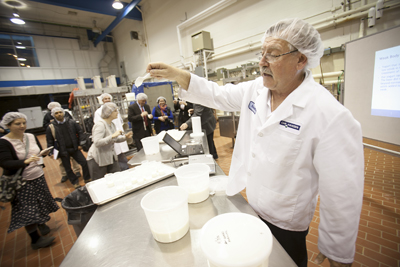N.Y. yogurt industry creates jobs, panel concludes
By Krishna Ramanujan

A boom to the New York dairy industry -- partly due to yogurt production that has more than doubled since 2005 -- means more jobs in the state and a growing sector in an otherwise sluggish economy. And Cornell plays a major role in new product innovation and dairy workforce training.
Such were the conclusions of a panel of Cornell experts and state and industry leaders who spoke at an open forum, "The yogurt revolution: How can New York support and expand this economic boom?" Nov. 8 on campus.
The event also included a tour of the $105 million renovation to Stocking Hall, which will include a pilot plant where industries can develop new products, and a 12,000-square-foot, state-of-the-art dairy processing plant, where students and industry professionals can get hands-on training and dairy products will be processed for use on campus. The facilities are slated to open in spring 2013.
It all starts with the high quality milk produced in New York state, a number of panel members emphasized. Though Cornell Cooperative extension has played a big role in increasing milk production per cow, the state's cool temperatures, "excellent" soil for grasses and precipitation make for an ideal geology and climate for milk production, said Patrick Hooker '84, former commissioner of the New York sState Department of Agriculture and Markets and current director of agribusiness development at the Empire State Development Corp.
"You add to that the location of this part of the country in relation to the consumers; 60 million consumers … all well within a day's drive of this production area, he said. "And you're talking about an ethnic and cultural diversity that you don't see anywhere else in the world" which has driven demand for dairy and yogurt.
Cornell's land-grant mission and state support, the College of Veterinary Medicine and the Animal Health Diagnostic Center all "provide an underpinning for animal health, animal welfare, environmental stewardship and business management" on dairy farms, Hooker added.
Thanks to these favorable factors for dairy, companies like Chobani, headquartered in Norwich, N.Y., started in 2005 and now does $1 billion in sales by specializing in Greek yogurt, a strained, thicker and creamier variety, said Bill Byrne, chairman of the board of Byrne Dairy. The rise in yogurt's popularity can be attributed to its high protein, low carbohydrates and pleasing taste for an increasingly health-conscious public, he added.
Greek yogurt takes advantage of producing an international product locally, where it can be shipped to consumers quickly to avoid spoilage, said Martin Wiedmann, professor of food science. "There is a need with increasing international populations to produce these products here," he added.
Due to such demand, as New York state manufacturing jobs dropped 9 percent from 2005-11, the state's dairy manufacturing job base increased by 3 percent. To fill new dairy jobs, Cornell plays a big role in training the workforce and retraining displaced workers from lost manufacturing jobs, said Tristan Zuber '08, a Cornell regional dairy processing extension associate based in Batavia. Cornell is developing new certificate, continuing education and possibly degree programs to meet these demands, she added.
The facilities being built in Stocking Hall will include a food processing development lab where industries can research, develop and run small-batch trials for new products; and a new dairy processing plant that will process annually some 1.5 million pounds of raw milk from Cornell cows, and 20,000 gallons of yogurt a year, along with cheeses, ice cream and other dairy products. The facilities will offer sites to train students and give workshops to industry professionals.
"We can combine the classroom teaching where we give students theoretical knowledge … with hands-on training in our world-class pilot plant facilities," said Carmen Moraru, professor of food science. Also, the proximity of dairy plants to campus allows for collaborations with industry experts and enables students to visit plants and gain experience, she added.
"The more you can relate the expansion of the dairy industry to jobs, the greater focus you can bring to the whole issue, and that synergy just continues to grow," said Darrel Aubertine, commissioner of the New York State Department of Agriculture and Markets.
Media Contact
Get Cornell news delivered right to your inbox.
Subscribe